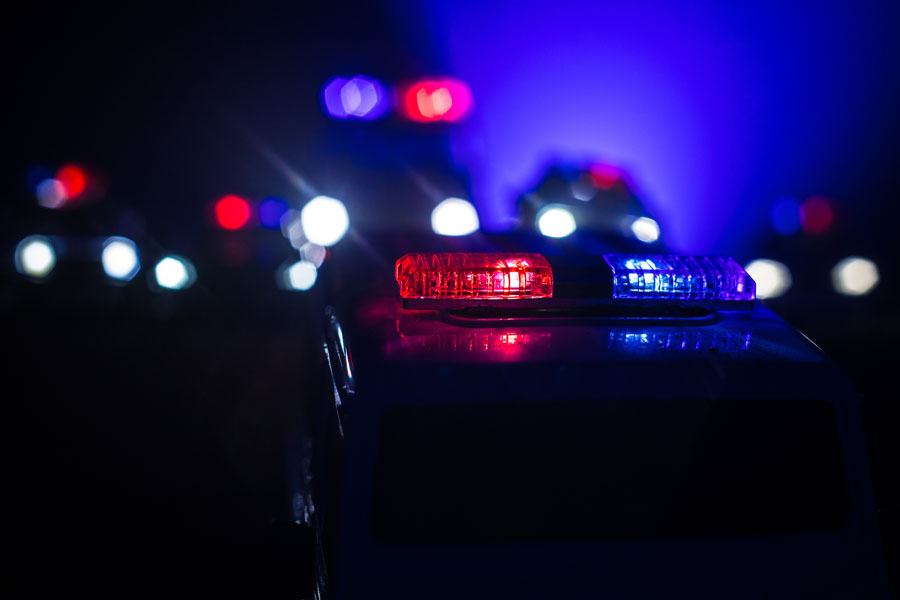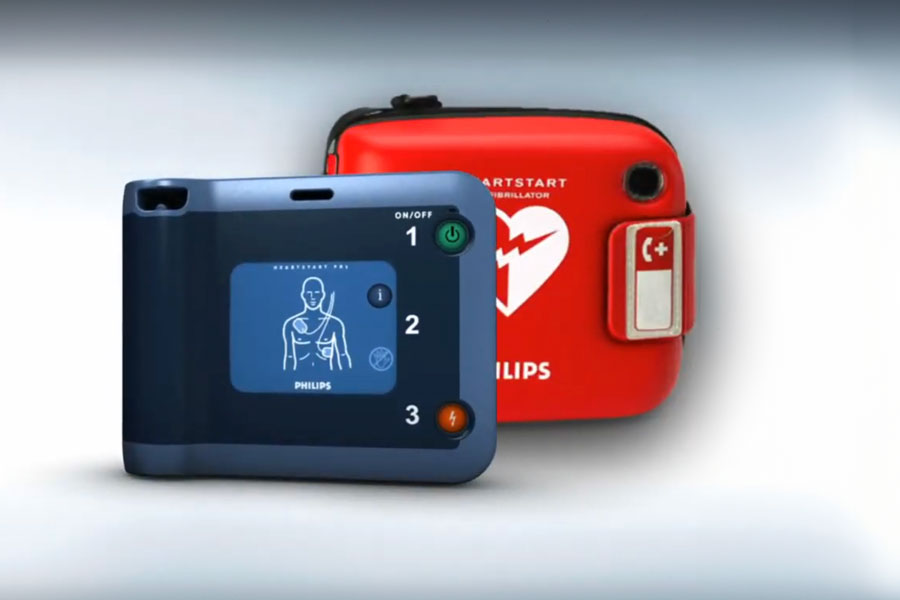Emergencies
Support When you need it most
If something happens on campus, University Police are here to help.
Though we focus on crime prevention, our campus is still susceptible to the same problems as any community. If or when an emergency occurs, officers are trained and ready to respond.


Dedicated to Safety
We have AEDs (Automated External Defibrillator) on campus to save lives.
To help save lives in times of emergency, we have are over 32 AEDs across the Green Bay campus, including in the concourse system, The Weidner and the Kress Events Center. AEDs are also available in University Police vehicles. AEDs are portable devices that deliver an electric shock to restore normal heart rhythm during sudden cardiac arrest, a leading cause of death in the U.S. They are user-friendly, providing clear voice instructions to guide rescuers through each step.
Emergency Procedures
Learn what to do and who to call for a variety of emergency situations.
Call 2300
When anyone is injured or property is damaged.
Call 911, then 2300
Statistically, a bomb threat that results in the recovery of or the detonation of an explosive device on universities within the United States is extremely low. Nationwide, the vast majority of these incidents are investigated and found to be a threat or hoax. Such threats, even if they are only a hoax, are a major disruption to UW-Green Bay community and will be taken seriously. University Police will pursue any individual involved in these criminal acts and demand prosecution to the fullest extent of both State and Federal Law.
If you observe a potential bomb/suspicious object on campus:
- Do not handle the object!
- Remain calm, clear the area
- Immediately call Police at 911, the designated emergency response number.
If you receive a bomb threat by phone, don't hang up. Often when bomb threats are received by phone they are calling a number they know goes to a specific location, not a specific person. You may be the only person to receive a call about this incident. Try to do the following:
- If possible, have someone else call 911. Otherwise, send an email, write a note, send a text and/or do what you can to let someone else know.
- Keep talking to the caller as long as possible and ask the following:
- When is the bomb going to explode?
- Where is it right now?
- What does it look like?
- What kind of bomb is it?
- What will cause it to explode?
- Did you place the bomb?
- Why did you place the bomb (What is their reasons)?
- What is your name or who are you representing?
- How can we contact you?
- While talking to the caller listen for: speech pattern, accent, background noise and other distinguishing characteristics.
- If caller hangs up, do not hang up your phone and leave it off the hook. Use another phone line to immediately notify Police at 911, the designated emergency response number.
- If the threat of an explosion is imminent, evacuate the building. Activate the fire alarm. Follow Evacuation Procedures.
- Once outside, move to a clear area that is at least 500 feet away from the affected building. Keep streets and walkways clear for emergency vehicles and crews.
- Do not return to an evacuated building unless authorized by the University Police or Fire Personnel.
Evacuate a building when an alarm sounds or if notified by emergency personnel, or by other means.
While evacuating the building:
- Do Not Use Elevators during an evacuation. Emergency personnel may use an elevator for evacuation after review of the circumstances.
- Walk quickly to the nearest marked exit and ask others to do the same.
- Once outside, keep clear of the building to allow others to exit. Keep streets and walkways for emergency vehicles and crews.
- Do Not Return to an evacuated building until advised by emergency personnel.
- Be aware of people with disabilities who may require assistance in an emergency evacuation.
If you have a disability and are unable to evacuate:
- Stay calm and take steps to protect yourself. If there is a working telephone, call 2300 and tell the dispatcher where you are or where you will be going.
- Move to an enclosed stairwell.
- Request persons exiting by stairwell to notify University Police or Emergency Personnel of your location.
- As soon as practical, move onto the stairway and await University Police or Emergency personnel.
*It is suggested that people with disabilities prepare for emergencies by learning the locations of exit corridors and enclosed stairwells and by informing co-workers, professors, and/or classmates of the best way to assist during an emergency.
Call 2300 if you experience hazardous vapors, gases or spills. Also:
- Inform others to evacuate using the nearest exit.
- If spreading, pull a fire alarm.
- Evacuate to nearest parking lot or designated assembly area.
Call 2300 if you experience a theft, vandalism, assault, etc. For an assault, get the victim to safety, stay with victim and call for help.
Call 2300
- Staff: contact a supervisor in the area.
- Students: contact a faculty or staff member.
- Keep something between you and the person.
- Call for assistance if you cannot locate the supervisor or faculty-staff, or if person is threatening.
Call 911, then 2300 and evacuate to nearest parking lot.
Call 911, then 2300
- Activate the Fire alarm.
- Evacuate building using the nearest exit.
- Do not use elevators.
- Wheelchair users wait for assistance in stairwell.
- Help those needing assistance.
- Before opening any door, use back of hand to check for heat. If hot, do not open!
- If heavy smoke or fire blocks an exit, use alternate exit.
- Evacuate to nearest parking lot or designated assembly area.
Minor Injuries:
- Call 2300
- Students: go to Student Health Services Office.
Unconscious Person or Serious Injuries:
- Call 911, then 2300
- Check for medic alert tag/bracelet; call for help.
Suspicious Letters & Packages
Call 2300
- Don't handle or open the letter or package.
- Don't shake, smell, or taste any substance on or within the letter or package.
- Isolate the letter or package. If you already have touched it, place it inside a plastic bag and seal it. If no bag is available, cover the letter or package with a wastebasket, towel, paper, or other item.
- Thoroughly wash your hands with soap or water.
- If a substance has spilled from the letter or package onto a desk or other area, cover the material with a wastebasket, towel, paper or other item.
- Lock and secure the room/area where the letter or package is located. Wait outside the room/area for the arrival of the University Police.
- Keep others out of the area until the arrival of the University Police.
- Assist University Police as directed. This may include providing a list of all persons who may have come in contact with the suspicious letter or package.
Characteristics of a Suspicious Letter or Package
- Powdery substance on the outside or inside.
- Excessive postage.
- Handwritten or poorly typed addresses.
- Incorrect titles.
- Title, but no name.
- Addressed to someone no longer with your organization, or otherwise outdated.
- No return address or one that cannot be verified as legitimate.
- Oily stains, discolorations or odor.
- Excessive weight.
- Lopsided or uneven envelope.
- Protruding wires or aluminum foil
- Excessive security material such as masking tape, string, etc.
- Visual distractions.
- Ticking sounds.
- Marked with restrictive endorsements, such as "Personal" or "Confidential".
- Shows a city or state in the postmark that does not match the return address.
- Letter or package is unexpected or from someone unfamiliar to you.
If you're unsure whether a letter or package is suspicious, contact the University Police. An officer will respond and make a threat assessment with your assistance.
For further information concerning terrorist threats, access these resources:
A Tornado Watch means conditions are favorable for tornado. Monitor weather conditions.
- Means a tornado was sighted; siren emits steady tone for 3 minutes.
- Evacuate to lowest level, interior room or hall.
- Stay away from window, glass and large open areas.
- Protect your head and face; get under a sturdy surface or structure.
- Monitor weather by radio or weather alert radio.
Weather Alert Radio Locations:
- University Police ext.2300
- Cofrin Library ext.2540
- Residence Life ext.2040
- Computing ext.2308
- University Information Center/Main Desk ext.2400
Call 911, then 2300 whether actual or threat of violence, go to a safe location and get help.

Connect With Us
We are committed to creating a safe and secure environment. If you have questions about what to do in case of emergency, University Police is here to help. If this is an emergency, call 911 or 2300.